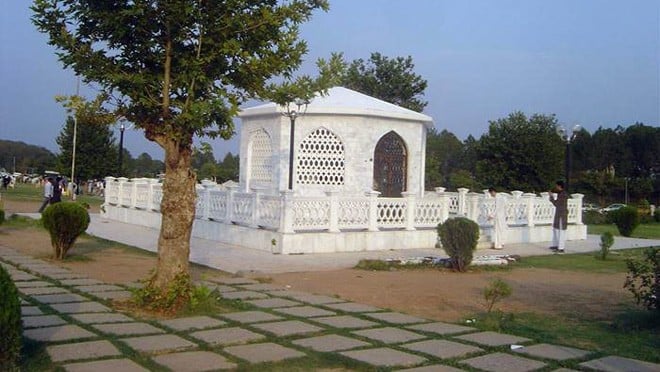
A few hours at the grave a week before his 27th death anniversary

In the shadow of the four majestic white marble minarets of the sprawling Shah Faisal Mosque that looms over Islamabad, a small octagonal white structure in marble with latticed screens sits on a silent corner. Built on a platform almost three feet above the ground level, this one-room structure has two iron doors. Both of them are locked but they do not deny the visitors a peep into the room.
A cemented grave, wrapped with two not so new chaders of red and green colours with Quranic verses written on them, a few dry rose petals scattered around the grave, a mop, and an almost empty cupboard is all that this room has. One needs to read the gravestone to realise that one of Pakistan’s most powerful men of his time lies in this grave. Yes, it belongs to the longest-serving military ruler of Pakistan -- Ziaul Haq. There is no poster, hoardings, or board erected anywhere close to the structure, indicating the presence of this grave.
It’s a week to his 27th death anniversary. An old tree on one side of the grave seems its only permanent companion. There is no caretaker deputed at the grave nor are there any regular visitors at the grave; only some people from among those who visit Faisal Mosque from other cities or from the capital itself come to offer Fateha on his grave.
"An elderly person, Yaqub Mirza, a retired official of Pakistan navy, used to visit the grave of ‘the great man’ daily. He used to bring fresh petals, sweep the room and spend some time here. But even he has not been coming here since late April this year. He may be ill," says Ihsan Bari, a clean-shaven photographer in his late 40s, carrying two cameras around his neck as he takes photographs of the visitors of the mosque.
Originally belonging to Toba Tek Singh district of Punjab, Ihsan came to Islamabad in mid-1980s as a young labourer who took part in the construction of the Faisal Mosque and, lately, has started his private business as a photographer at this venue. A great admirer of Zia, he vividly remembered the day he was buried in August 1988. The record shows that diplomats from more than 70 nations, including 30 heads of state, attended his funeral. "But nobody comes to his grave now. Not even Pakistani leaders. His son Ejaz ul Haq comes occasionally, may be once after two month. I do not remember that a Pakistani leader has visited the grave for years. They all have forgotten him. Not even the military officials come here," he says.
Ihsan remembers his first and second death anniversaries when Nawaz Sharif also came; those were attended by thousands of people. The number started decreasing and now only a couple of hundred people come here on August 17 every year, he says.
There are other visitors who have no love lost for the man. Muhammad Basharat, an attendant of Faisal Mosque, tells me that on the last Friday of this Ramzan, an elderly man came to his grave, abused him loudly in front of many people and also destroyed some parts of the pillars of the outer boundary wall of the grave. "It has happened several times here. One time his gravestone was also broken. Some people also try to do more indecent things; there is nobody to stop them."
The cupboard in the room was used to keep the copies of Holy Quran, but as nobody comes here to recite Quran it is empty now, says Basharat. "People comment on what actually lies in the grave in place of his body. But one should respect it because it belongs to one of the country’s former rulers."
At that point, two young boys aged between 15-16 years pass by. Curious, they come to the locked gate of the grave. They talk to each other in Pashto and start moving away from the premises. "We both are students of Jamia Faridia, a religious seminary headed by Maulana Abdul Aziz of Lal Masjid. We know this is the grave of Ziaul Haq. He was a better ruler than all the current rulers of Pakistan," they say and go away without telling their names.
Two boys pass the grave without noticing it. "We do not know whose grave is this," says Niaz Ali, 20, a student of computer sciences at Peshawar University who has come to see his friend Sharafat Ali, 24, who is studying at a local private institute in Islamabad. Both belong to Swat. "We do not know about Ziaul Haq’s death anniversary but we do believe that his policies are to some extent responsible for what happened to us in Swat a few years back," says Sharafat Ali, referring to the ‘Talibanisation’ of their beautiful valley.
They are in no mood to discuss Zia or his grave anymore and leave without offering Fateha.
A bearded man, with his shalwar tied in a way that his ankles show, passes by along with a clean-shaven young man. They both climb up the three steps of platform to reach the locked door of the grave. They are out the next minute and ready to go before I can catch up with them.
"I didn’t know that Zia’s grave was situated here. I only came to visit the mosque," says Hafiz Abdullah Siddique, the bearded prayer leaders from a mosque in Jhang. "He has done a good job for our religion. I like him. Look, I do not think that one should curse a dead person."
A few more people gather under the tree only a few feet away from the grave as Siddique starts giving his sermon in the humid August heat. "Our army helped the Mujahideen under his leadership but today it is killing them. This is the difference between Ziaul Haq’s Pakistan and today’s Pakistan," he says.